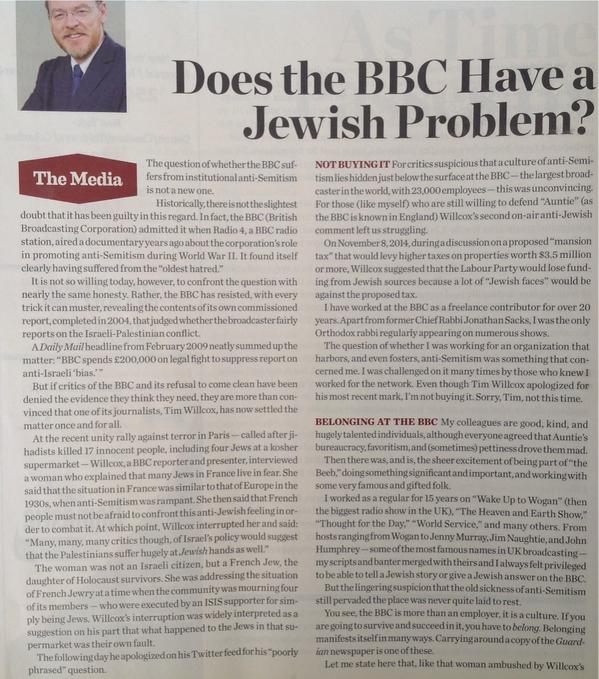Past BBC contributor Rabbi YY Rubinstein recently published a column in the magazine ‘Mishpacha‘ in which he asked “does the BBC have a Jewish problem?”. Whilst the article does not appear to be available at the magazine’s website (a transcript is however available here), a scanned version has been circulated on social media and readers of its opening paragraphs may find some background information helpful.
“The question of whether the BBC suffers from institutional anti-Semitism is not a new one.
Historically, there is not the slightest doubt that it has been guilty in this regard. In fact the BBC (the British Broadcasting Corporation) admitted it when Radio 4, a BBC radio station, aired a documentary years ago about the corporations’s role in promoting anti-Semitism in World War ll. It found itself clearly having suffered from “the world’s oldest hatred.”
It is not so willing today, however, to confront the question with nearly the same honesty. Rather, the BBC has resisted, with every trick it can muster, revealing the contents of its own commissioned report, completed on 2004, that judged whether the broadcaster fairly reports on the Israel-Palestine conflict.”
The report to which the writer refers is of course the Balen Report. The prizewinning Radio 4 documentary he mentions (broadcast in 1993) was called ‘The Unspeakable Atrocity’ and The Independent published a review of the programme at the time which makes for spine-chilling reading.
The take-away message must surely be recognition of the fact that attitudes determine policies which then shape the news. And of course news, in turn, influences attitudes.
The Tim Willcox affair has presented the BBC with the opportunity not only to address the specific points made in complaints, but also to tackle the broader issue of how attitudes within the organisation determine policies which, for example, shaped the news it produced during last year’s conflict between Hamas and Israel or result in racist comments being allowed to stand on its message boards – and to take responsibility for the results at the end of the chain which begins with those attitudes.
Let’s hope that the most will be made of that opportunity.






